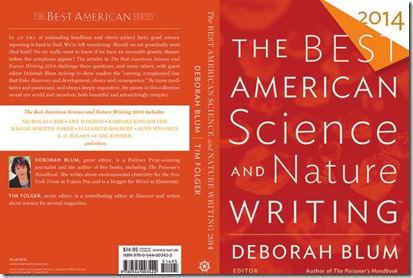By James Wallace Harris, Tuesday, November 4, 2014
Every fall, I look forward to the Best American series coming out, especially the Best American Science and Nature Writing. The 2014 annuals collects the best of what was published in 2013. If you’re not much of a magazine reader, these annual volumes of essays, short stories, travel writing, mystery stories, sports stories, comics, and even infographics, is a great way to read the best-of-the-best of periodical journalism. I usually get the volumes for short stories, essays and science and nature writing. There also a volume from another publisher, The Best American Science Writing that follows the same format of having a series editor with a yearly guest editor. Between the two, it’s an easy way to keep up with a broad range of scientific studies. They aren’t technical, but extremely well-written reporting of science related news, so even people who aren’t science geeks will enjoy them.
I’m listing the table of contents for the Best American Science and Nature Writing 2014 with links to those articles still available on the web, so you can sample the writing. The Kindle edition at $8.52 is a cheap way to have inspiring short reads on your mobile device – and the paper copy is only $14.95 at your favorite bookstore. Amazon offers a free sampler of the 2012 Best American series, the collects pieces from all the different subject anthologies. For science and nature this year, we have:
- “Mixed Up” by Katherine Bagley
- “The Great Forgetting” by Nicholas Carr
- “The Social Life of Genes” by David Dobbs
- “What Our Telescopes Couldn’t See” by Pippa Goldschmidt
- “A Race to Save the Orange by Altering Its DNA” by Amy Harmon
- “A Life-or-Death Situation” by Robin Marantz Henig
- “23 and You” by Virginia Hughes
- “Why the Brain Prefers Paper” by Ferris Jabr
- “O-Rings” by Sarah Stewart Johnson
- “When Animals Mourn” by Barbara J. King
- “Where It Begins” by Barbara Kingsolver
- “Danger! This Mission to Mars Could Bore You to Death!” by Maggie Koerth-Baker
- “The Lost World” by Elizabeth Kolbert
- “Awakening” by Joshua Lang
- “Imagining the Post-Antibiotics Future” by Maryn McKenna
- “The Return of Measles” by Seth Mnookin
- “Ants Go Marching” by Justin Nobel
- “TV as Birth Control” by Fred Pearce
- “The Madness of Planets” by Corey S. Powell
- “Learning How to Die in the Anthropocene” by Roy Scranton
- “Under Water” by Kate Sheppard
- “Twelve Ways of Viewing Alaska’s Wild, White Sheep” by Bill Sherwonit
- “The Separating Sickness” by Rebecca Solnit
- “Trapline” by David Treuer
- “The Rebirth of Gorongosa” by E. O. Wilson
- “Bringing Them Back to Life” by Carl Zimmer
These Best American volumes are perfect for ebook reading. Most people hate reading off their computer screens, and few people read magazines anymore, even when they subscribe. I know many people now that have discovered reading books on their smartphones, so these anthologies of shorter pieces are perfect for reading when you have an idle moment now and then.
Some of these stories are philosophical or political in nature, like “Learning How to Die in the Anthropocene” by Roy Scranton, who uses his experiences as a soldier in Iraq to contemplate the inevitable consequences of climate change. Or Pippa Goldschmidt’s “What Our Telescopes Couldn’t See” about her time as an astronomer looking at quasars, and then turning her gaze back to events on Earth. A profound philosophical statement is made by Nicholas Carr in “The Great Forgetting” questioning how much of human endeavors should we share with machines.
Many of the stories are like the terrific “Ants Go Marching” by Justin Nobel, who chronicles the fascinating history of fire ants in America, and his travels around the south visiting folks battling the invasion. Fire ant armies might sound scary, but what’s terrifying is “Imagining the Post-Antibiotics Future” by Maryn McKenna. I watched a documentary on PBS Frontline about diseases resistant to antibiotics recently, and it’s far scarier than Ebola, and about equally horrifying as Climate Change.
And don’t let me leave you thinking that all science stories are scary. There’s some good news reports like, “TV as Birth Control” by Fred Pearce, which chronicles how television is helping reduce the population growth in India.
Stories about science, nature and technology really are stories about humans adapting to their environment. We’re constantly at war with Mother Nature, often killing ourselves in our own friendly fire. The history of science is one of humanity making tremendous mistakes, but the overall trends shows we’re learning more and more every year. Humans are the primary cause of climate change – we the primary cause of most changes on the Earth right now. We change everything we touch. We have a long track record of fucking things up, but we’re learning to do better. We’re in a great race – can we learn enough to save ourselves before we make ourselves extinct. We’re in an exciting dead heat at the moment. Most of these stories are reports from the front, about various battles to conquer ourselves.
JWH

